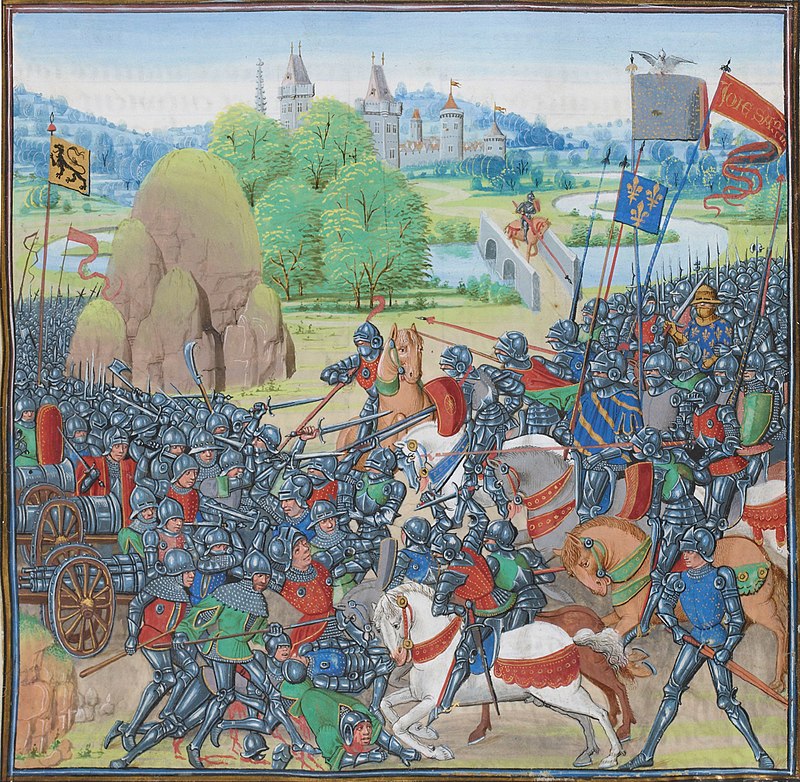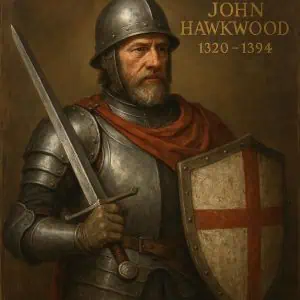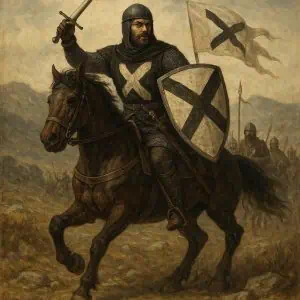Jean Boucicaut (1366–1421), also known as Jean II Le Maingre, was one of the most renowned knights of late medieval France, celebrated for his unmatched skill in combat, deep sense of chivalry, and unwavering loyalty to the French crown. Rising to prominence during the Hundred Years’ War, Boucicaut embodied the ideals of the perfect knight — brave, honorable, and devout. As Marshal of France, he played a key role in major military campaigns across Europe and the Near East, while also helping to found the prestigious Order of the White Lady, promoting knightly virtue and moral conduct. His life and legend illustrate the height of medieval knighthood, where valor on the battlefield met the noble pursuit of honor and faith.

Throughout a greater part of his life, he was actively involved in undertaking extensive journeys spanning over years and taking a direct part in battlefield combat.
For this reason, he lived to participate in many immensely important and historically significant battles of his day.
Due to his chivalry, military skill, and loyalty, he was granted the title and position of Marshal of France by Charles VI in 1391.
He became one of the most renowned knights of the late medieval period and was noted for his characteristic chivalry at a time when the knightly mores were eroding in Europe.
💡 Did You Know? Fascinating Facts About Jean Boucicaut
His early training and courage in battle earned him the title of knight long before most men of his generation.
Chroniclers wrote that Boucicaut could leap onto a horse while wearing full armor — a true testament to his athleticism.
Through the Order of the White Lady, Boucicaut encouraged knights to defend women, the poor, and uphold the principles of chivalry.
Even in defeat, Boucicaut’s honor impressed his English foes, who respected him as a model of true knighthood.
Jean Boucicaut Early Life
Boucicaut became attached to the knightly culture at a very young age. He participated in the Normandy campaign of Louis II as a young page.
Louis later knighted him at the Battle of Roosebeke when was only 16. Having knighthood and first-hand combat experience at such a young age, Jean Boucicaut then went on to forge a long knightly career.

Jean Boucicaut Travels and Battles
Boucicaut undertook several long journeys early in his life. Aged 17 in 1383, he began a journey that took him to Lithuania where the Teutonic Order was waging a crusade against the pagans.

He then reached Spain where he participated in the Reconquista battles against the Moors. Boucicaut then turned homeward and reached France only to return to Spain again in order to fight alongside the duke of Bourbon in the Hundred Years’ War between English and French.

For the next two years, Boucicaut once again set out on a journey, travelling through Balkans, the Near East, and the Holy Land this time. A low point in his career came in 1396 when he was captured by the Ottomans following the Battle of Nicopolis.
However, unlike most other prisoners of the battle, he was ransomed and wasn’t executed by the Sultan.

Jean Boucicaut as Chivalrous Knight
Boucicaut embodied most of the traits of chivalry that were typically associated with medieval knights. He composed a set of poems defending the chivalrous ideal of the knight.
In 1390, he participated in a tournament where he bested some of the best English knights of the time. In 1399, he founded a knightly order which was meant to be based on the ideal of knightly love.

Jean Boucicaut in the French Court
Due to his knightly chivalry, his military experience, and his loyalty to the crown, Charles VI honored Boucicaut at the French court. He named Boucicaut the Marshal of France in 1391.
Later, Boucicaut was granted the governorship of Genoa in 1401. He remained at Genoa until 1409, striving against a Genoese population increasingly hostile to the French, finally losing the French control over the region in 1409.

Upon returning to France he was active on the battlefield and was a part of the Battle of Agincourt where the French lost. Boucicaut was captured and taken as a prisoner to England where he died in 1421.
❓ Frequently Asked Questions About Jean Boucicaut
1. Who was Jean Boucicaut?
Jean Boucicaut (1366–1421), also known as Jean II Le Maingre, was a famous French knight and Marshal of France. He was celebrated for his bravery, sense of chivalry, and loyalty during the Hundred Years’ War.
2. What made Jean Boucicaut famous?
Boucicaut earned a reputation as one of the most skilled knights in Europe. He fought in major battles against the English, led crusades, and became a symbol of the ideal medieval French knight.
3. What was Jean Boucicaut’s role as Marshal of France?
As Marshal of France, Boucicaut commanded armies, organized campaigns, and upheld the traditions of French knighthood. His leadership and courage inspired generations of soldiers and nobles alike.
4. What was the Order of the White Lady?
Boucicaut helped establish the Order of the White Lady, a chivalric brotherhood dedicated to defending women, promoting virtue, and restoring the moral ideals of knighthood.
5. Did Jean Boucicaut participate in the Crusades?
Yes. Boucicaut joined expeditions to the Holy Land and the Balkans, continuing the medieval knightly tradition of pilgrimage and holy warfare.
6. How did Jean Boucicaut’s career end?
He was captured by the English after the Battle of Agincourt (1415) and spent his final years imprisoned in England, where he died in 1421.
7. Why is Jean Boucicaut remembered today?
He is remembered as the embodiment of chivalric ideals — courage, faith, and honor. His story continues to represent the spirit of the medieval French knight.
⚔️ Test Your Knowledge: Jean Boucicaut Quiz






